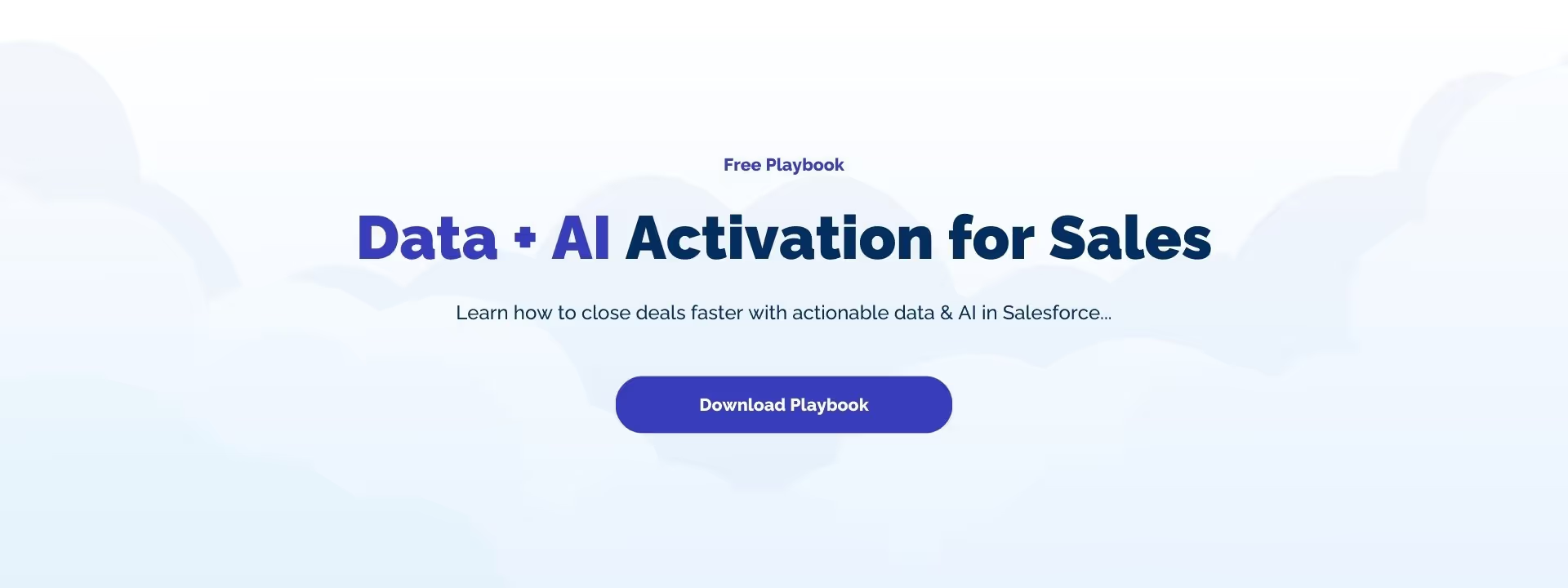AI is everywhere these days. ChatGPT, Copilots, AI-powered chatbots are being released at a high pace, and are becoming more prominent in our daily flow of work.
And there is no doubt about it: these are very powerful tools that can significantly increase your work efficiency and productivity. From automating repetitive manual tasks, to proactively bringing key insights to the surface, AI can start to play a significant role in how you do your daily job.
Sales is especially a great place to start implementing AI-driven use cases through data activation. Let’s dig deeper!
1. What is Data + AI Activation for Sales?
First, let’s talk about what we mean by “data + AI activation”.
Data + AI activation refers to the process of making data available, and operationalising it within AI-driven use cases for sales teams.
This involves unifying and harnessing all your customer data into a central CRM system, allowing your sales team to access and utilise this data in their everyday workflows.
By breaking down data silos, your sales team can achieve a holistic view of their prospects, customers, accounts, and sales opportunities, thereby transforming their sales operations.
Data activation means bringing all that unified customer data securely together into your CRM, where your sales teams can use it in AI-driven workflows or other applications that directly interact with your customers and prospects.
And that can lead to some powerful benefits for your sales team.
2. The Benefits of Data + AI Activation for Sales
In fact, the benefits of data + AI activation often extend beyond your sales organisation, but here are some key benefits to highlight from a sales perspective…
Better customer engagement and outreach
By delving into unified customer data directly within your CRM, you gain richer insights into your customers' behaviours and preferences. There's no need for external systems or applications. Acting on these insights enhances your engagement, aligning your responses with your customers' true needs rather than what you assume they might be.
Increased sales efficiency
With all your necessary data and smart analytics consolidated in one accessible spot, you can streamline your sales decision-making and strategically position your sales teams for maximum impact and optimal deal closure. This efficiency doesn't just boost your team's productivity—it also enhances the overall customer experience, thanks to your more streamlined and effective processes.
Shortened sales cycles
Unified data provides instant access to all the information you need to quickly seal your deals. The faster you reach an agreement with your customers, the sooner they can start benefiting from your products and services.
Increased win rates & revenue growth
Aha, what it ultimately is all about, isn’t it? Boosting win rates and revenue growth is directly achievable through data-informed sales tactics, which lead to higher conversion rates and increased customer satisfaction. Ultimately, this results in elevated revenue figures.
Now, let’s make these benefits more tangible by exploring two specific use cases on how sales teams can leverage data + AI activation.

3. How Sales can leverage Data + AI
Okay, so now that you understand what data activation is, and how it can benefit sales teams, how do you make that tangible? In other words; how do you use integrated data to achieve your sales goals?
Let’s dive into some use cases together.
Use case 1: Increase cross-sell & upsell opportunities
In this fictional use case, you’re running the sales department of a regional Leisure Travel company named JourneyMax.
JourneyMax offers tailored travel packages and experiences to individual consumers and groups, focusing on unique and personalised vacations. This offering includes a range from adventure tours and luxury getaways to family-friendly vacations and cultural exploration trips.
The challenge:
As the Sales Manager of JourneyMax, you’re faced with significant difficulties in effectively utilising the company’s disconnected data sources, including online sales, customer loyalty programs, and in-store transactions.
This fragmented data estate hinders your ability to personalise marketing efforts and efficiently target upselling and cross-selling opportunities to your existing customer base.
The solution:
To address these issues, your organisation adopted a centralised data activation approach. Through a Salesforce Data Cloud implementation, your company can now integrate data from billing and subscription records, web engagement logs, and third-party systems into its CRM system.
Getting data ready for activation…
How JourneyMax activates data + AI:
Identifying future booking opportunities through structured data analysis:
By leveraging booking records and payment histories stored in your CRM system, your sales team can conduct detailed analyses of previous customer transactions to discern patterns in travel preferences and spending behaviours.
This allows your team to prioritise outreach to those customers most likely to book new trips. Equipped with this refined data, the marketing and sales teams tailor their communications to encourage upgrades and additional services, effectively enhancing cross-selling and upselling efforts.
Customising travel package recommendations through unstructured data analysis:
By evaluating web engagement logs and social media interactions, JourneyMax Travel uncovers valuable insights into their customers' preferences and travel behaviours. The marketing team leverages this information to suggest travel packages and experiences that resonate with the individual histories and current desires of their customers, thereby enhancing satisfaction and driving increased bookings.
Focusing on high-value travellers through transaction history analysis:
Structured data, such as past booking details and payment records, enables JourneyMax’s sales teams to assess the potential value of each customer. This analysis helps in identifying those travellers who are more likely to be interested in premium packages and additional services. By prioritising these high-value customers for upselling and cross-selling opportunities, your team can allocate their resources more effectively, ensuring a targeted and efficient approach to sales.
Business outcomes:
Boosted Revenue:
By customising their marketing efforts to target customers who show the greatest likelihood of interest in premium upgrades and additional services, JourneyMax's sales team significantly increases the company's revenue.
Enhanced Sales Productivity:
By strategically directing their efforts towards the most promising leads, JourneyMax's sales teams operate more productively and efficiently, optimising their resource use and maximising output.
Use case 2: Close deals faster with AI Agents
In this fictional use case, you’re running the sales department of a global tech company with multiple sales divisions around the world.
The challenge:
With multiple divisions around the world, each one operates independently and has their own Salesforce org. The goal is to build AI Agents to help your sales teams make better business decisions and drive more efficient sales operations.
However, with the disconnected data sources and extensive amounts of data being collected, it’s hard to know where to start.
The solution:
The solution is similar to the use case above. An implementation of Data Cloud where all data is harmonised and unified, will help build the right data foundation for AI activation.
The company uses Data Cloud to bring data from all the Salesforce orgs and ERP systems into one Salesforce instance. It integrates consumption and web-tracking data in the same instance. After the data is cleansed of errors, inconsistencies, and duplications, it forms the foundation the company needs for effective analytics and predictions powered by AI.
How to activate data + AI:
Identify and prioritise quality prospects:
An AI Agent for sales can now use this data to prioritise which prospects to target, when, and with which offers.
Improve forecasting accuracy:
AI Agents can analyse combined datasets, including sales, billing, and customer usage patterns, to generate accurate sales forecasts and operational insights. With better visibility into customer behaviour, sales teams are motivated to close more deals.
Set proactive AI alerts for better sales engagement:
The sales team decides to put AI to work here, too. Data such as customer interaction history, sales pipeline details, survey responses, customer support tickets, and product usage and engagement metrics is fed into AI, which creates alerts for at-risk deals.
The sales team can then adjust their sales strategies to address potential risks quickly. By reaching out to customers and addressing their concerns in a timely manner, the sales team can close deals that were previously at risk.
Personalise deal plans:
With the help of AI, the sales team uses data-informed insights and predictive analytics to identify key customer segments and their specific needs quickly and more accurately
Business outcomes:
Better decisions:
AI-driven insights about customer preferences and risks give the sales reps the tools to make better decisions and close deals faster.
Increased sales efficiency:
Personalized AI deal plans and proactive risk management drives up sales productivity and efficiency.
Better risk mitigation:
AI-generated risk alerts and recommendations lead to better and quicker risk mitigation, which helps close more deals faster.
4. How to build a data foundation for AI-driven Sales
As we wrap up our exploration of data activation for enhancing sales effectiveness, it’s essential to focus on actionable steps that can translate the concept of data + AI activation into tangible results.
To begin, you need to have the right data foundation in place to leverage AI. This means aligning your data strategy with your business and sales objectives is crucial. This alignment ensures that every piece of data collected and analysed directly supports your primary goals, whether it's speeding up the sales cycle or boosting upsell opportunities.
Identifying the precise data needed and involving stakeholders like IT and customer service early on will facilitate smoother data integration and enhance security.
Moreover, the human aspect of data activation cannot be overlooked. Communicating the benefits of a data-driven approach to your sales team will not only encourage buy-in but also demonstrate how it simplifies their tasks and increases potential earnings.
Supplement this with targeted training programs that empower your team to effectively use the data at their disposal. Implementing a system for ongoing feedback will help in continuously refining your strategies and ensuring they remain effective as market dynamics evolve.
By following these steps, you'll set your team—and your entire organisation—on a path to more strategic, informed, and successful selling, marking a significant shift towards a data-empowered future.



























